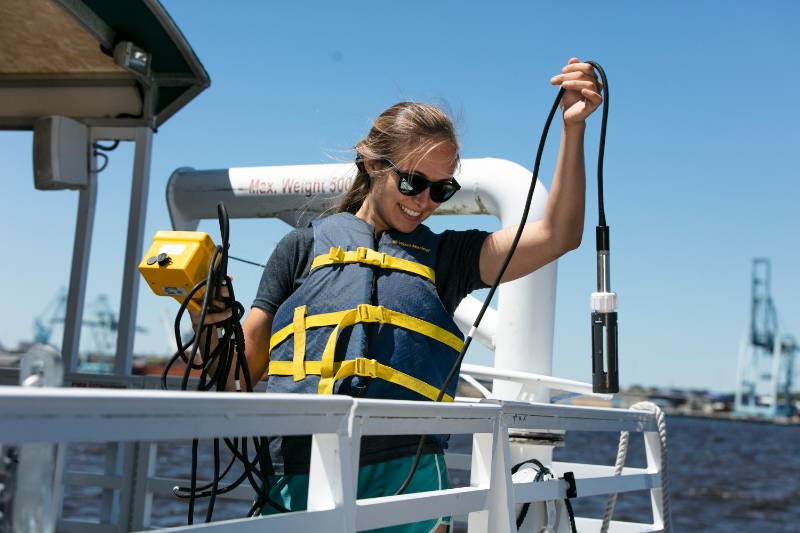Earn your master's degreeMarine Science Graduate Programs

Program Options
Jacksonville University's four graduate marine science degree programs are designed to provide graduates with specific knowledge and skills necessary to be successful in a variety of marine-related positions in industry, government, and education, or for entry into doctoral marine science programs. We offer the following programs:
- Master of Arts in Marine Science
- Master of Science in Marine Science
- Master of Science in Marine Studies
- Dual Degree: MA in Marine Science and Master in Public Policy
Our programs prioritize flexibility and convenience so you can balance your studies with your work and home life. Many of our programs feature hybrid, fully-online, and low-residency options. We also maintain strong industry partnerships with organizations like OCEARCH and The St. John's Riverkeeper that allow our students real-world learning experiences that perfectly compliment our cutting-edge curriculum.
Which track is right for me?
M.A. Marine Science
- 0-24 credit hours can be taken online or hybrid; Minimum 6 credit hours in person
- Comprehensive written exam required
- Completion requires either:
- 6 credit hours of lab/field-intensive coursework, or
- low-residency summer field/lab intensive sessions
- 2-year program (full time)
- Ideal for:
- Students who seek a graduate degree for increased employment opportunities or pay scales
- Working professionals, particularly those with flexible summer schedules
M.S. Marine Science
- Minimum 24 credit hours in person; Maximum 6 credit hours online
- No comprehensive written exam required
- Completion requires original research-based project with written thesis and oral defense
- 2-3 year program (full time)
- Ideal for:
- Students who seek research-based careers
- Students who plan to continue on to a Ph.D. program
M.S. Marine Studies
- Highest flexibility; program can be taken fully online, in person, or in hybrid format
- Comprehensive written exam required
- Completion requires 2-semester capstone project
- 2-year program (full time)
- Ideal for:
- Students who seek a graduate degree for increased employment opportunities or pay scales
- Flexible format for working professionals who require distance learning
Which track is right for me?
| Program Factor | M.A. Marine Science | M.S. Marine Science | M.S. Marine Studies |
|---|---|---|---|
| Learning Format (out of 30 credit hours) |
|
|
|
| Comprehensive Written Exam | Yes | No | Yes |
| Thesis or Project | Either:
|
Original research-based project with written thesis and oral defense | 2-semester capstone project |
| Length of Program | 2 years (full time) | 2-3 years (full time) | 2 years (full time) |
| Ideal For |
|
|
|
| Learn More | M.A. Marine Science | M.S. Marine Science | M.S. Marine Studies |
The College TourJackson's Story
Jackson Hooten is passionate about Great White Sharks. And the Marine Science Research Institute and OCEARCH facility at Jacksonville University, along with renowned shark researcher Dr. Bryan Franks, has allowed Jackson to closely study them. OCEARCH helps scientists collect data on the ocean while open-sourcing their information. It is also one of the largest shark tagging organizations in the world, and is right here on campus! Jackson actually met his graduate advisor, Dr. Franks, while he was collecting data on an OCEARCH vessel. Now, he is completing his Master of Science in Marine Science and is going on to work for the federal government as an ecologist, later planning to pursue a Ph.D.
If the request form does not automatically appear below, please click here to open the form in a new window.
Partnering with OCEARCHExperiential Learning
Jacksonville University and OCEARCH have a cooperative partnership to foster and promote unique opportunities for student-centered learning and meaningful scientific research. This partnership shares the values of both organizations with an emphasis on scientific inquiry, innovation, collaborative research, sustainability, and experiential learning. Students have the opportunity to be at the forefront of high-caliber research and one-of-a-kind learning experiences.
This partnership also allows the University to expand the number and variety of opportunities for students majoring in disciplines, such as sustainability, environmental sciences, engineering, aviation, communications, and film.
Our Partnership with OCEARCH
I'm Christina LoBuglio, I'm a graduate assistant at Jacksonville University assisting in the OCEARCH JU partnership. We're currently in Nova Scotia fishing for some great white sharks. The OCEARCH JU partnership involves OCEARCH leveraging our professors and students for scientific research and allows JU to use OCEARCH as a platform for practical fieldwork.
We just got word that there's a shark hooked up so we're moving the lift over and we're getting ready to do our work up. I think it's a great partnership it allows students to have that practical real-world field experience and it allows our professors to come out and do the research that they want to do in order to help scientific community. I am super excited about the future of this partnership and what we can gain from it. We can continue doing scientific research so that we can help protect our oceans and the future of our planet, and allow other students to get the experience that they need.
Request Information
Contact Information Graduate and Professional Studies
Phone: (904) 256-7000
Email: graduateadmissions@ju.edu
